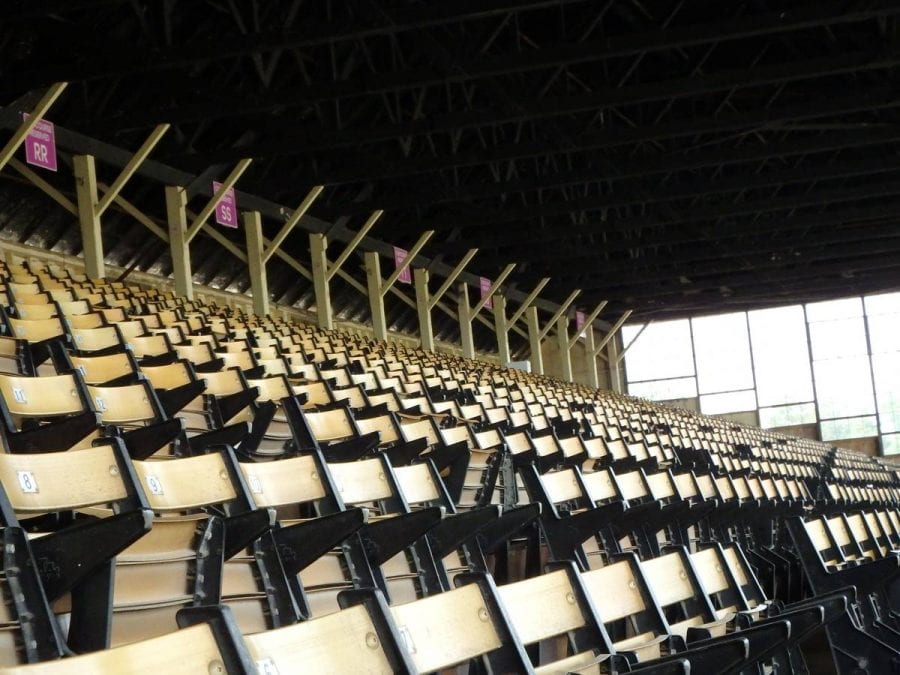Pimlico battle reaches Md. Racing Commission as sides spar

A dozen days after the Maryland Jockey Club announced it would close part of the Pimlico grandstand to the public, including over Preakness weekend — and just over three weeks before the Middle Jewel is run — the battle over Old Hilltop made its way to the Maryland Racing Commission Thursday at its monthly meeting at Laurel Park.
Delegate Sandy Rosenberg, a Democrat representing Baltimore City, appeared before the Commission to ask that it “use its authority… to address some very important issues.”
Rosenberg, representing the city’s State House delegation, called on the Commission to:
- obtain and make publicly available the Maryland Jockey Club’s (MJC) engineering report that served as the basis for the company’s decision to close down the “third division,” the oldest section of the grandstand at Pimlico;
- deny further requests by the MJC to use Racetrack Facilities Renewal Account (RFRA) funds until housing on the backsides at Laurel and Pimlico has been improved and any outstanding issues addressed; and
- require the MJC “provide a plan” outlining the steps it will take to ensure that Pimlico is in good repair for subsequent runnings of the Preakness.
“The law is still the law,” and it requires the Preakness to be run at Pimlico, Rosenberg told the Commission.
Rosenberg said in an interview after the meeting that his bottom line for Pimlico is “the Stadium Authority report — very simply.”
That report, issued this past December, envisioned a completely remade Pimlico serving not only as the home of the Preakness but also as a hub of economic and social activity for the surrounding neighborhood.
It did not, however, specify how the new showplace — estimated to cost more than $420 million — would be paid for.
“The city introduced a bill that said everyone should come to the table and discuss all that,” Rosenberg said. “That was the conclusion of the Stadium Authority report. The parties should be discusing how to fund the recommendations.”
All well and good, said attorney Alan Rifkin, whose firm, Rifkin Weiner Livingston, represents the MJC. But he said the major hurdle to those discussions is the city itself; the city has filed suit seeking to use eminent domain to take Pimlico, the Preakness, and all the associated trademarks.
“We completely agree we should be talking to the city,” Rifkin said. “We have written to the City Solicitor now half a dozen times letting the City Solicitor know our position, which is, we’re pleased to begin discussions immediately once you withdraw the lawsuit. The city’s lawsuit is an impediment to discussions.”
He said that the lawsuit creates complications and compromises that would make discussions at this time pointless. It also impacts “our business enterprise” and “our relationships with financial institutions.”
“We’d like to begin the negotiations and would do so immediately, but we’re not going to do so while there is a baseless suit hanging over us like a Sword of Damocles,” Rifkin said, adding that he believed the City’s lawsuit was preempted by state law, which assigns to the state exclusive authority over racing matters.
As for the other matters on Rosenberg’s wishlist, Rifkin denied any political motive behind the timing of the announcement to close part of the Pimlico grandstand, which included more than 6,000 seats. The company had moved “expeditiously, not just timely,” once it received the report in late March, Rifkin said.
He also agreed to provide the engineering report to the Commission under a confidentiality agreement, since it is part of the pending litigation.
And Maryland Jockey Club president Sal Sinatra told the Commission that the company had resolved all but one of the backstretch housing issues that had been cited in a late March visit by Anne Arundel County inspectors. He said he expected that one outstanding issue — involving how certain windows open — to be taken care of shortly.
What happens next is anyone’s guess. The Stronach Group and city of Baltimore managed to counterbalance each other and create a standoff in the Legislature. The company’s preferred legislation in the recently completed state legislative session would have allowed it to work with the Maryland Economic Development Corporation to issue bonds to support building out Laurel and revitalizing the Bowie training center, but even after a last-minute intervention by state Sen. Bill Ferguson (D-Baltimore City) provided the city substantial leverage in return, the city delegation in the House of Delegates balked and the bill died.
“We had not been involved in the discussions. All these discussions were with the Senate side,” Rosenberg said. “So we thought it was not appropriate to move forward.”
The city’s bill — to create a workgroup to study how to finance the Stadium Authority’s Pimlico vision — met a similar fate.
Which leaves the Thoroughbred industry exactly where it’s been: with a crumbling Pimlico, a grandiose vision of a new Old Hilltop, and no way to bridge the gap.
The deadline for the MJC to respond to the city’s lawsuit seeking to take Pimlico and the Preakness is May 15, and if the city does not withdraw its suit prior to that, the company will move to have the case dismissed, Rifkin told the Commission.
Three days after that deadline will be the 144th running of the Preakness, Maryland’s annual celebration of the Thoroughbred, which this year will take place before an empty third division: a visual reminder of the uncertainty at the industry’s heart.








